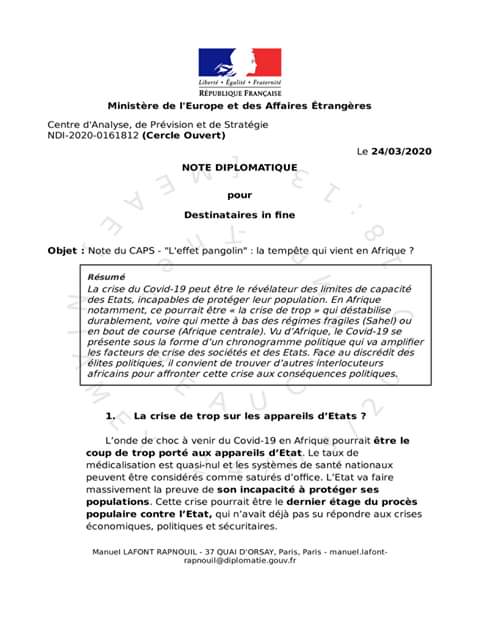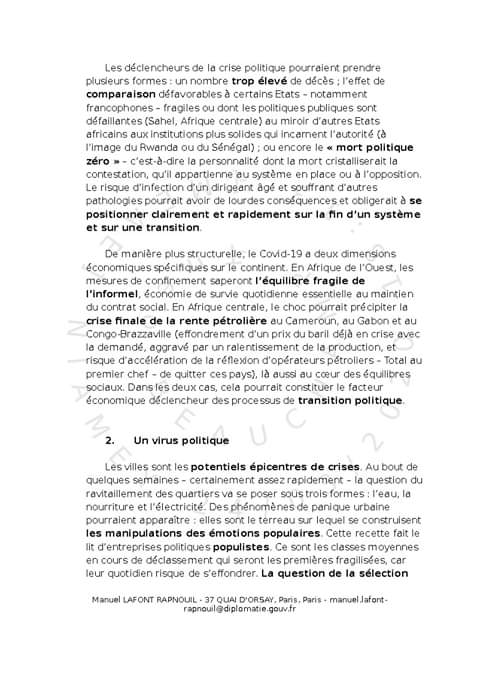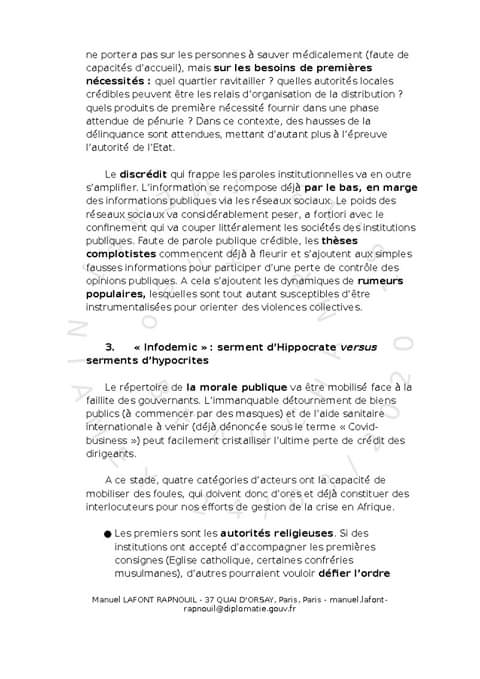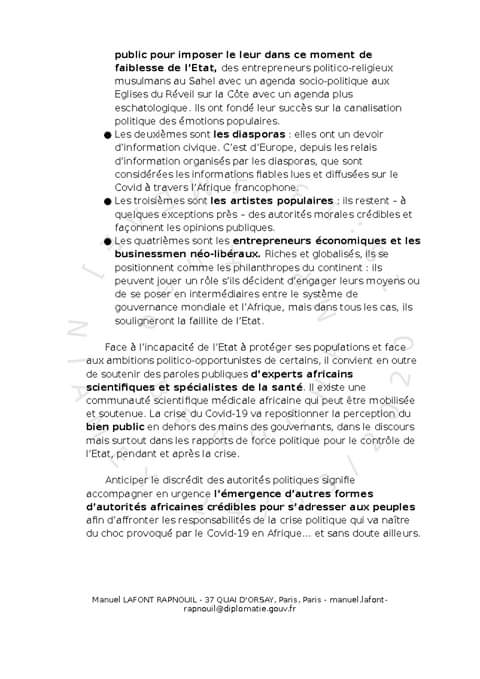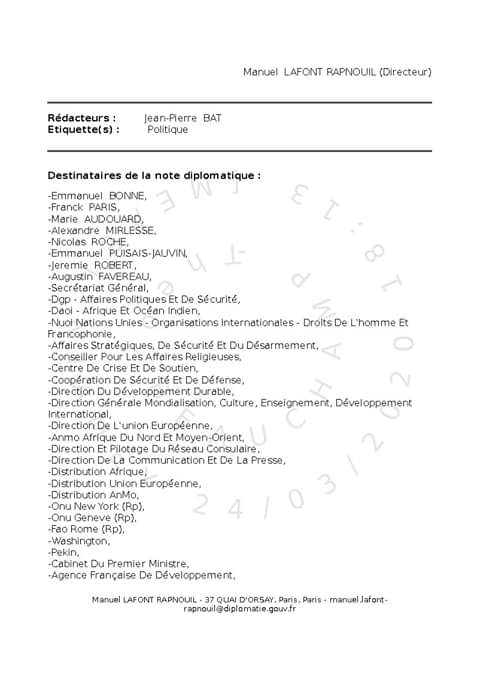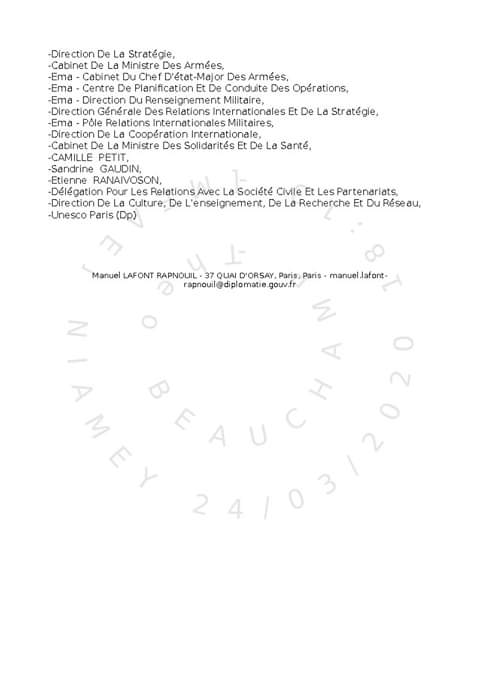
(Ecofin Agency) – The coronavirus continues to wreak havoc around the world. With around 6,000 cases the African continent remains relatively unscathed for the time being. But in the opinion of some experts, the future impact of the pandemic in Africa could be catastrophic to the point of causing the collapse of several states on the continent.
In a diplomatic note from the Center for Analysis, Forecasting and Strategy (CAPS),entitled “The pangolin effect: the storm coming to Africa? ” ,Obtained by theEcofin Agency, the French Ministry of Foreign Affairs predicts a quasi-apocalyptic effect of COVID-19 on African states. According to the government’s think tank, ” seen from Africa, the Covid-19 comes in the form of a political chronogram which will amplify the crisis factors of societies and states “.
Failed states
According to the report, the pandemic of the new coronavirus will be ” the crisis of too many which destabilizes durably, even which puts down fragile regimes (Sahel) or ultimately (Central Africa) “. For CAPS, ” the rate of medicalization […] is almost zero and national health systems can be considered as saturated automatically “.
COVID-19 should therefore reveal the “inability” of African states to protect their populations. The health crisis that comes with the disease will, according to the note, lead to a political crisis that could be triggered by too many deaths, or even the infection of an ” elderly leader “. In this scenario, the States most exposed to destabilization would be those of the Sahel and Central Africa, characterized by “ failing public policies ”, unlike other countries with “ more solid institutions ” such as Rwanda or the Senegal.
The CAPS also indicates that the weakening of the authority of the States targeted by the study will also be manifested in the power struggles that will be triggered for the control of information. “ The discredit that strikes the institutional words will also increase. Information is already being reconstructed from below, alongside public information via social networks. The weight of social networks will weigh considerably, a fortiori with the confinement which will literally cut societies from public institutions, ”the document said.
A huge socio-economic impact
“ In West Africa, containment measures will undermine the fragile balance of the informal, an economy of daily survival essential to the maintenance of the social contract. In Central Africa, the shock could precipitate the final crisis in oil rent in Cameroon, Gabon and Congo-Brazzaville, there too, at the heart of social equilibrium, ”indicates the Quai d’Orsay.
In a quasi-Hollywood scenario, the institution also indicates that the essential needs linked to the health crisis should reveal phenomena of urban panic in African cities. “ The question of selection will not relate to the people to be saved medically (lack of reception capacities), but on the basic needs: which district to supply? which credible local authorities can be the relay for organizing distribution? what essential products to supply in an expected phase of shortage? »Indicates the CAPS. This situation should lead to increases in crime, making the authority of the state even more fragile.
New contacts for France
In view of the political, economic and health catastrophe predicted, CAPS suggests that France turn to new interlocutors with whom to coordinate ” efforts to manage the crisis in Africa “. Four categories of actors have been identified for this purpose. These are the religious authorities, some of whom ” might want to defy public order to impose theirs in this moment of state weakness “; diasporas, who have “ a duty to provide civic information ”; popular artists who are ” credible moral authorities and shape public opinion “; and finally ” economic entrepreneurs and neo-liberal businessmen “.
“ Anticipating the discredit of the political authorities means urgently supporting the emergence of other forms of credible African authorities to address the people in order to face the responsibilities of the political crisis which will arise from the shock provoked by the Covid-19 in Africa, ”say CAPS experts, clearly convinced that the new pandemic will bring about a real political revolution in African countries.
Cold analysis or presumption of incapacity?
On reading the note, it emerges that the scenario drawn up by the experts at the Quai d’Orsay leaves no room for optimism as to the capacity of the Sahel and Central African states to cope with the crisis. The analysis even deeply questions the sense of responsibility of African leaders: ” The inevitable misappropriation of public goods (starting with masks) and future international health aid (already denounced under the term” Covidbusiness “) can easily crystallize the ultimate credit loss for executives, “the document says. This opinion is consistent with several previous reports, which paint a completely bleak picture of African governance systems and public policies.
However, if it is true that many African countries are considered fragile, are they also helpless in the face of the new crisis?
Unlike the European, American and Asian continents which record hundreds of thousands of cases and deaths, Africa is still very little affected by the pandemic. In addition to having taken restrictive measures very early to curb the spread of the virus, the very large population of young people in African countries could favor a lower death rate than other continents.
It should also be noted that, even if the data and contexts are different each time, it is not the first time that African countries, specifically those of the Sahel and Central Africa, have faced a large-scale epidemic. Between 2014 and 2016, West African countries, with the help of the international community, demonstrated a certain resilience to the Ebola epidemic which left 11,310 people dead in the region. More recently, despite the security crisis in the DRC, the country has also managed to control the disease which left 2,268 people dead in the process.
In view of these elements, there is still hope that the COVID-19 pandemic will be brought under control by African countries, supported by the international community. Although corruption and poor governance have often characterized many countries on the continent, it must be recognized that the many efforts that have been made so far represent positive points in these times of crisis.
One thing is certain, the so-called fragile and failing countries, according to the Quai d’Orsay note, have already acquired a lot of experience in crisis management, whether political or health. Considering that these experiences can represent an asset seems for the time being, clearly more judicious than to count on a scenario as dark as that drawn up by the experts of the CAPS.
Fascimile of the documents:
Moutiou Adjibi Nourou
Source: Ecofin Agency
